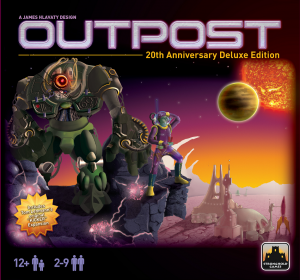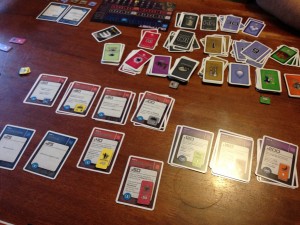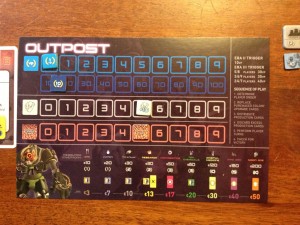Review: Outpost
Posted by James (admin) on September 4th, 2012
 Outpost is a futuristic economic game set in space which is richer than it may first sound. The game ends as soon as one player has gained 75 victory points (VPs) or more, and the winner is player with the most VPs at the end of that round.
Outpost is a futuristic economic game set in space which is richer than it may first sound. The game ends as soon as one player has gained 75 victory points (VPs) or more, and the winner is player with the most VPs at the end of that round.
Player start with some ore mining facilities and a few human colonists to run them. During the game, players will build new (and usually better) production facilities and will gain technologies and more colonists too. The golden rule is (apart from one exception) if you don’t have colonists (or robots) to run a production facility, it is not ‘manned’ so does not produce anything and is worth 0 VPs. Each player has their own player board which shows their current VPs, maximum number of human colonists, and the maximum hand size (cards).
At the start of each round, players draw income cards – one for each staffed production facility. There are different decks for each type of facility and the cards say how many credits of income they have generated. For example, the Ore Mining cards are the least valuable with an average value of 3 credits; whereas, the next better facility is Water Production whose cards are worth an average of 7 credits each. (The best facility’s cards have an average value of 5o credits!) However, the better facilities cost more to build, and many have restrictions and/or require technologies too. This is a nice game mechanic as you know roughly what income you’ll get, but there’s still some randomness too. There are 3 types of production facilities which, if you have 4 of the same, allow you to draw a single Mega resource card which gives a guaranteed and slightly better than average total than 4 individual cards (however, 4 separate cards of high value would be greater than the mega card – it’s up to you whether you want to risk it or not).

Technology cards (the lower left 4 are currently for auction) and the top shows the different income decks for different resources.
In the middle of the table are various technology cards – better and more powerful technologies come into play as the game progresses. Each round, 4 random technologies (of those that are currently available) are available for auction. On their turn, Also, a player can purchase production facilities and colonists, plus a player can initiate an auction of any of the available technology cards. The technology cards are very important as many determine what you can build and give you advantages so these will determine your priorities and strategy. For example, one card allows you to build robots (which ignore the maximum colonist limit), others increase your colonist limit (so you can man more facilities with humans). Some cards increase your hand limit and some give you discounts on auctions for particular techs. In some cases, you can’t build certain types of facility without a relevant technology. Importantly, all technology cards are worth VPs too.
Each round, players take their turn in the order of their current VPs. As players can always take part in auctions, player order is not too important and going later in a round is advantageous because you then know who has, and who has not, spent money so you have more information about who may be potential bidders for any remaining auctions.
One very important rule is that, for any purchase, a player gets no change back from the cards they use to pay for something. You can pay for multiple identical items in one transaction, but you have to pay for different items as separate transactions.
Overall, Outpost may sound a bit dry but it is surprisingly compelling. Each player looks at the technologies slightly differently because they all have slightly different technologies, production facilities and strategies; however, there is usually a lot of competition in the auctions for them. As most of your income cards will be of very varied values, anyone playing this game had better like mental arithmetic because it’s vital and continuous.
The game progresses well as you’re always gaining technologies and new items – I always felt engaged thinking about what I was going to build next and almost every turn felt like I had more to play with than before. The first few turns are fairly similar for all players as they all start with the same items, but these pass very quickly and players start along different development paths. Also, the game feels active as player order changes a lot from turn to turn as players leapfrog each other’s scores as they gain new technologies (although this does slow down towards the end as the spread of VPs widens), plus, enough player interaction is generated from the auctions.
 There were a couple of minor downsides. The key one was the later auctions could take ages to resolve as players keep re-calculating different mixes of their cards so they can raise their bid by an amount which also fully utilises the value of their cards. For example, if you want to raise a bid of 67 by about 5 credits, you may as well raise it by 7 if the next combinable value of your cards above 67 is 74. So, the ‘no change’ rule caused this. The result was that some auctions took many minutes as players crept the bids up (and we’re good at maths too). In future, I think I would make a rule that either (a) players must work out the total card value they will spend on the auction and then put the cards aside so they just bid without looking (and work out the best cards to meet the winning bid afterwards), or (b) players must commit cards to a face-down pile as they bid, so placing card(s) equal to 17 credit card covers a bid raise of 17.
There were a couple of minor downsides. The key one was the later auctions could take ages to resolve as players keep re-calculating different mixes of their cards so they can raise their bid by an amount which also fully utilises the value of their cards. For example, if you want to raise a bid of 67 by about 5 credits, you may as well raise it by 7 if the next combinable value of your cards above 67 is 74. So, the ‘no change’ rule caused this. The result was that some auctions took many minutes as players crept the bids up (and we’re good at maths too). In future, I think I would make a rule that either (a) players must work out the total card value they will spend on the auction and then put the cards aside so they just bid without looking (and work out the best cards to meet the winning bid afterwards), or (b) players must commit cards to a face-down pile as they bid, so placing card(s) equal to 17 credit card covers a bid raise of 17.
The second downside for me was that towards the end I felt the game was a bit longer than I would have liked, but I think this was mainly due to the length of some of our auctions. Also, one thing I would have liked to know was the spread of the values of the resource cards – the average is very important but I also wanted to know how high or low they may go and were the values evenly spread out.
Falling behind seemed like it could be an issue because if you get one turn of development behind other players, it can often be hard to catch up as they start to generate greater income – One technology card (or even a low value resource card at the wrong moment) could make all the difference. I don’t think this is a problem, it just means Outpost is probably not too forgiving. I’ll be interested to see how it plays it after several games as I got the impression that the final technology cards are where the game is really won as they can be worth 15VPs each, so just one of those (and getting the accompanying large income card for it each round too) makes a massive difference.
In the end, Outpost was a really pleasant surprise which I would definitely like to play again (and maybe use the different expansion technology cards too). It was engaging, delivered depth and decision-making, yet was also simple.
James.
[Played with 4 players]

